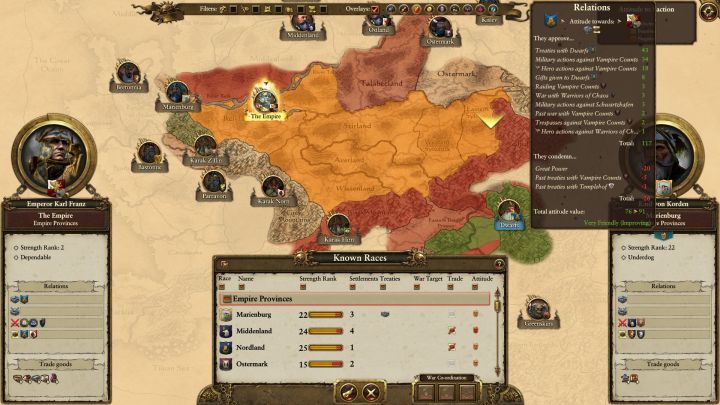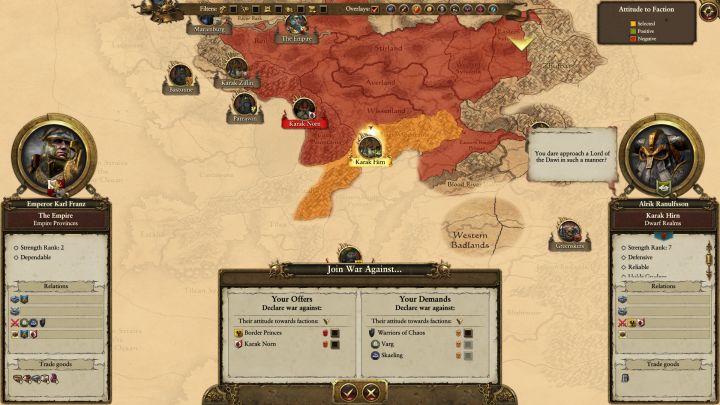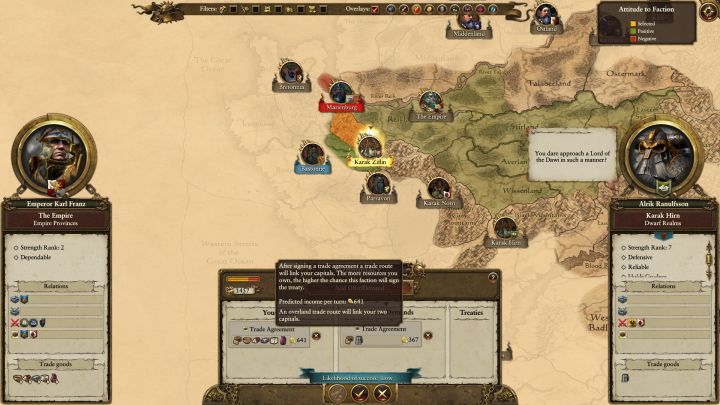Total War Warhammer: Diplomacy and trade
Diplomacy in the game might not be as important as in other games from this genre, but it still is a quite an important aspect of the gameplay. Thanks to that you will be able to trade with other factions, maintain friendly relations (or sign military treaties), or even assimilate other factions into your kingdom.
- How to use diplomacy
- Benefits of friendly relations
- Joining confederacy and vassals
- How does the trade work
How to use diplomacy

Diplomacy window can be summoned by pressing the button located in the bottom right corner of the screen, or with the "5" key. Afterwards, the world map view will be displayed and you will be able to see all the factions you've discovered so far. By default (if you don't click on any faction), you will be able to see your kingdom's relations with other factions. If you, however, click on any faction, you will be able to see its relations with other factions (yours included) in the game. This is presented with different colors:
- The green color indicates that a faction is friendly towards you (or towards the selected faction).
- The brown color indicates that the relations are neutral.
- The red color indicates that the relations are hostile.
- The orange color marks the terrains that are under the selected faction's control.
Additionally, by clicking on a faction you will be able to see various information, such as all the treaties between your factions, or trade goods that are available to that faction. By hovering your mouse over a faction you will be able to see the list of things that have positive and negative impact on your relations. Information on that screen is divided into:
- Things that the faction approves - all the things that they "like". Those can be treaties with that faction (or a faction that is friendly towards this one), gifts, or hostile actions against their enemies.
- Things they condemn - all the thing that they "don't like". Multiple things influence those, such as your heroes' actions (attacking armies, heroes and settlements of a faction), military actions directed at that faction, or even moving around their province in the 'raiding' stance. Even trivial things such as difference in power have influence on that. If your faction is stronger than the other one, you will receive a -20 point penalty to relations with it.
- Total attitude value - your relations with a specific faction. If it's green (positive value) it means, that your relations are friendly, but if it's red (negative value) it indicates, that the other faction is hostile towards you.
Races of factions also have a huge impact on the relations. If you are playing, for instance, as The Empire you will be given a penalty of -40 points with Greenskins (this is marked as Aversion). Factions that can't stand each other (like Dwarves-Greenskins) will always have a penalty to their relations.
Benefits of friendly relations

The biggest benefit of friendly relations (aside from trading, of course) is the possibility to move through other faction's province without troubles, as well as the ability call help when a hostile faction declares war on you. By having neutral (or hostile) relations with a faction you won't be able to move through their terrains, as each time you enter them you will be given a penalty to your relations (marked as "trespassing" on the diplomacy screen). This problem can be solved by signing a "military access" treaty - afterwards you will be able to move without any problems.
Another and equally aspect of close, friendly relations with a faction is the possibility to call them during war time. This way you will receive help if a hostile faction declares war on you, and your armies are located on the other side of the map. It works in two ways - if you refrain from helping an ally when he needs help, you will receive a huge penalty to relations with that faction.
It's also useful when you are fighting your own wars, as you will be able to summon allies for help. This is invaluable when you are planning to attack a faction that has multiple settlements and armies scattered around a huge area, as you won't be able to handle them alone. However, you should use the help of factions that can't conquer terrains you declare war on - this way you will be able to claim those settlements and capital cities for yourself.
Joining confederacy and vassals
Aside from standard diplomatic options, the game gives you the opportunity to assimilate other factions (force them to join confederacy), or for a faction to become your vassal. The first option (joining confederacy) allows you to take over all of the terrains and units the faction had under its command, and the faction ceases to exist. Unfortunately, it's a very risky move - each time you do so, you will be given a huge (-50 points) penalty to relations with other factions, and the effect will last for several turns. Also, remember that you can "inherit" a really bad economy situation from the faction that you assimilate - if that faction had -2000 income per turn, your income will also decrease by that value.
Nominating a faction your vassal works somewhat different. They will remain on the map, you won't get any of their units or settlements, but each turn they will pay you a tribute - a large portion of their income. Additionally, diplomatic options of that faction are severely limited, as you will now be responsible for that.
In both cases you will need very friendly relations with the faction that you want to assimilate, or turn into your vassal. Additionally, the stronger your kingdom becomes (more armies, provinces, higher income), the harder it will be to perform such an action. From a certain moment you practically won't be able to do that anymore - all of the factions, even those that have over 500 points with you and are way weaker won't be willing to join you. It's more of a curiosity.
How does the trade work

You can trade with other factions only when you have at least one tradable resource (iron, stone, wood, and so on) produced in one of your settlements and the faction you want to trade with doesn't have it yet. The value of each resource is different (you can check it in the lower left corner of the diplomacy screen). Additionally, the amount of gold you will earn by trading it depends on the amount of the resource you can produce (the higher the level of the building that can manufacture it, the more gold you will be able to earn from it).
It works in quite a weird way. By signing a trade agreement you send all of your resources to the faction you trade with (aside from those that the faction already has) and vice versa. A simple example will allow you to understand it better:
- Your faction has wood, iron, marble and wine to export, while the faction you want to trade with has only pottery for trade. You will export all of those resources to them, and import pottery. In this cast you will earn many times less gold from this trade than your trade partner will.
- In a situation in which both factions have wood, iron and stone, yours have wine, and the other one marble, you will only be sending wine and the other faction marble, as all of the remaining resources are available to both sides.
Each resource you export will increase the income of your faction, whereas each imported one will increase the income of your trade partner. Unfortunately, you can't decide which resources you want to send them and which you want to receive. In late game it causes situations in which you can earn 100 gold from trade, while the other faction 600 or more. However, it's still worth to do that, as you won't be really losing anything, and trading increases relations with a faction.
You are not permitted to copy any image, text or info from this page. This site is not associated with and/or endorsed by the developers and the publishers. All logos and images are copyrighted by their respective owners.
Copyright © 2000 - 2026 Webedia Polska SA for gamepressure.com, unofficial game guides, walkthroughs, secrets, game tips, maps & strategies for top games.
